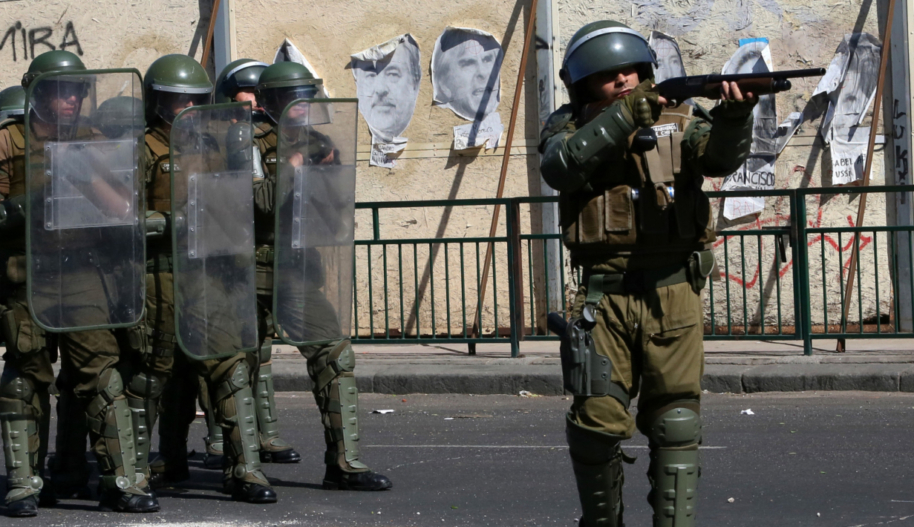Approval of the privileged legitimate defence bill, known as the Nain Retamal bill, which increases the penalties for crimes committed against members of the Carabineros police force, Investigative Police and Gendarmerie, and establishes privileged legitimate defence regarding actions related to the use of force, would have serious consequences for human rights, Amnesty International warned today.
“Progress in strengthening the police and crime prevention in the country is necessary, but such a complex problem needs to be addressed seriously, responsibly and based on international human rights standards. The fast tracking of the so-called ‘Nain Retamal Bill’, far from addressing the structural problems that afflict the Carabineros and that surfaced dramatically in the 2019 crisis, is an opportunist response which would signal a huge setback in terms of human rights,” said Rodrigo Bustos, executive director of Amnesty International Chile.
Amnesty International believes it is essential that the Senate rectify this error and that the government fulfill its commitments and introduce the necessary amendments to correct the flaws in the bill in the upper chamber. Establishing a kind of legal presumption in favour of the police, including when human rights violations may have been committed, is really dangerous.
Nain Retamal bill would authorize the disproportionate use of force
In its current form, the Nain Retamal bill authorizes the disproportionate use of force, breaching the principles of necessity and proportionality and international jurisprudence on the issue of both United Nations treaty bodies and the Inter-American Human Rights system. In addition, the new grounds for legitimate defence may limit the exercise of judicial guarantees for victims of human rights violations, since the wording of the bill is very ambiguous and favours the subjective interpretation of the official involved in the incident when establishing whether or not self-defence is legitimate.
‘The Chilean authorities have forgotten that an effective way to protect both citizens and police officers is to implement a comprehensive reform of the Carabineros.’
Erika Guevara-Rosas, Americas director at Amnesty International
“The Chilean authorities have forgotten that an effective way to protect both citizens and police officers is to implement a comprehensive reform of the Carabineros. Ignoring the real need for transformation of the institution means missing a historic opportunity that was forged through the suffering of thousands of victims during the social upheaval,” said Erika Guevara-Rosas, Americas director at Amnesty International.
The extreme speed that has characterized the legislative process regarding this bill followed the killing of two police officers, serious crimes that Amnesty International condemns and that must be duly investigated and punished. However, no attempt to make progress on public security should violate human rights; and both perspectives should be included in the debate.
Seeking to justify the approval of this bill by stating that it will increase security is not only wrong but will, on the contrary, increase the risk of police abuses and human rights violations and of impunity for such abuses and violations. While there is a need to ensure protection mechanisms for law enforcement officials, these must be based on the protection of human rights, setting clear limits and equipping staff with the appropriate tools to carry out their work.
Minimal progress made on police reform
Following the serious and widespread human rights violations committed in the context of the social upheaval by the Carabineros, a consensus was reached on the urgency of comprehensive reform of the police, with which the government had said it agreed. However, more than three years after the mass protests, there has been minimal progress on the issue. Police reform must include, among other aspects, adequate training, resources and tools to use force, when necessary, in a proportionate and progressive manner and accepting command responsibility for the consequences of interventions. It must also ensure greater civilian oversight and updated protocols that have respect for human rights as their central focus.
“Under the impending Nain Retamal Law, violations of human rights and crimes under international law, as appalling as those committed during the social upheaval, could occur again more frequently and with less possibility of being adequately punished, since the ‘privileged’ grounds also reverse the burden of proof by requiring the victim to prove that this exemption does not apply. We urge the authorities to reconsider this and to direct their efforts toward ensuring that the Nain Retamal Law is not a source of impunity and abuse and to commit themselves to comprehensive reform of the Carabineros institution, as the Executive promised in its programme of government,” added Rodrigo Bustos.













